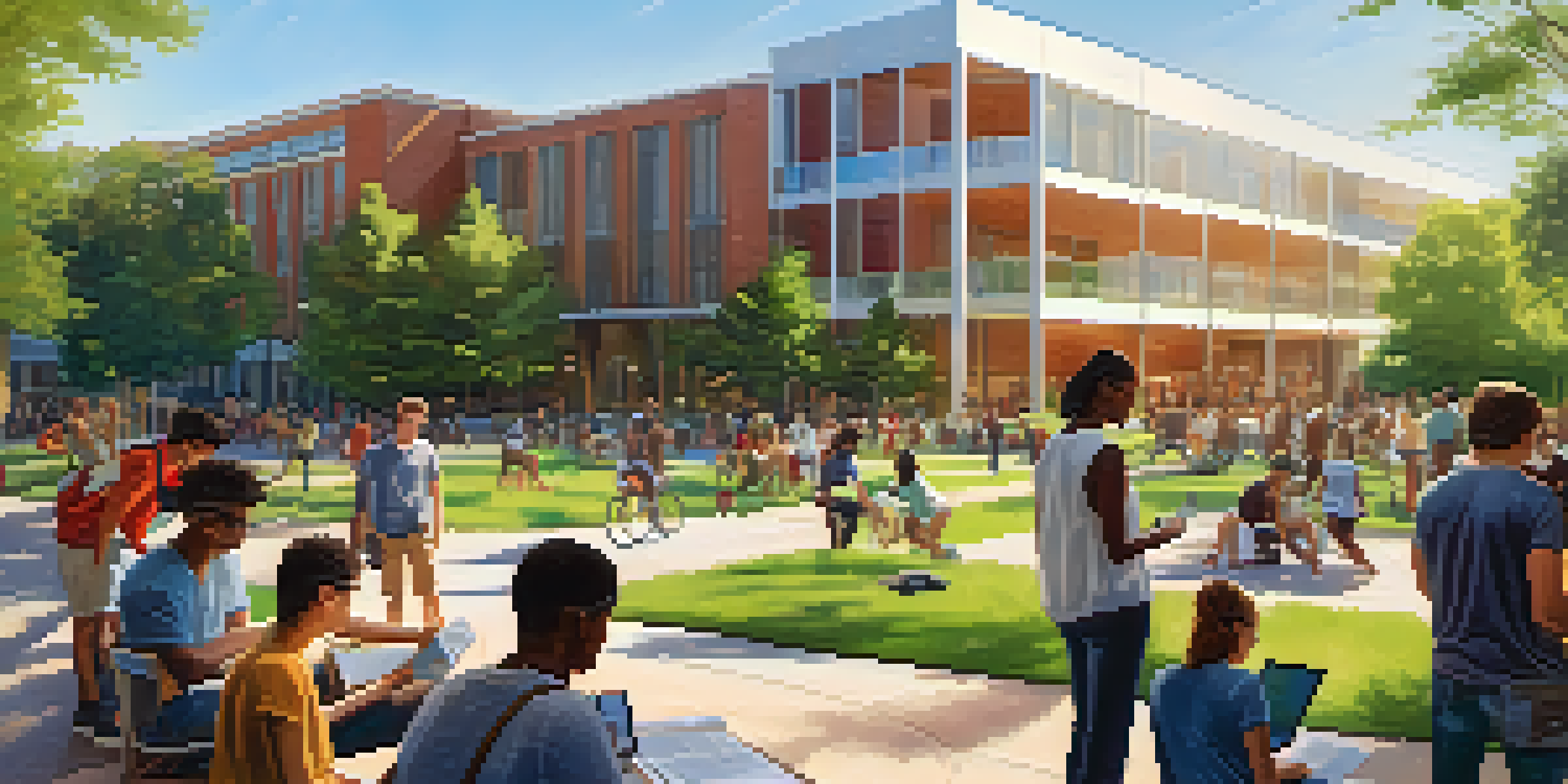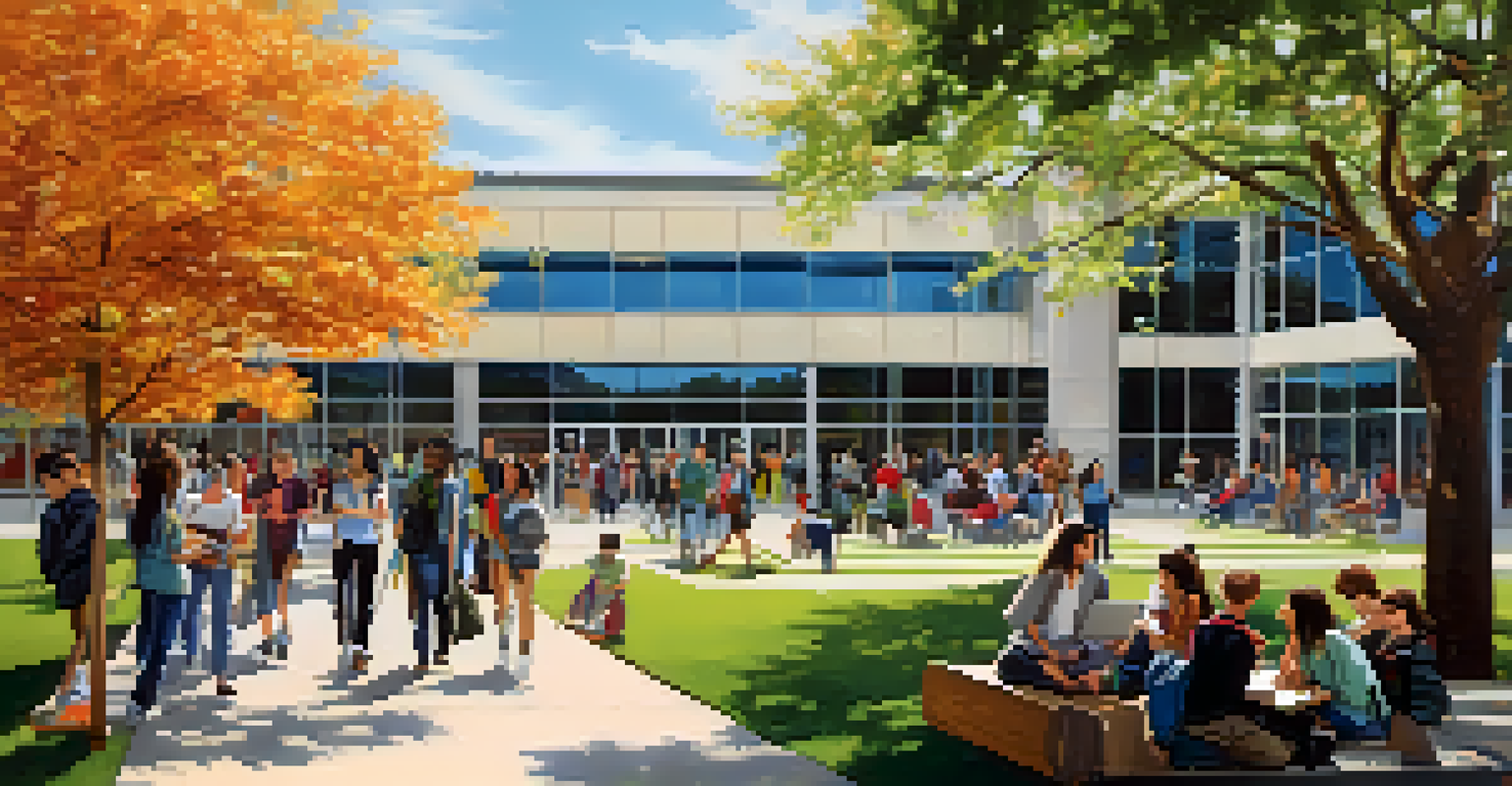The Role of Education in Raleigh's Economic Development

Education as a Catalyst for Economic Growth in Raleigh
Education serves as a cornerstone for Raleigh's economic landscape. With universities and colleges in the area, the city has cultivated a skilled workforce that attracts local and national businesses. This influx of talent not only boosts employment opportunities but also fosters innovation and entrepreneurship, vital for a thriving economy.
Education is the most powerful weapon which you can use to change the world.
The presence of institutions like North Carolina State University enhances the local economy by providing research opportunities and partnerships with businesses. This collaboration often leads to the development of new technologies and industries, driving economic diversification in the region. As a result, Raleigh is not just a place for education; it's a hub for economic advancement.
Moreover, a well-educated population typically leads to higher income levels and improved quality of life. As residents gain access to better job prospects, they contribute to the economy through increased spending, which further stimulates local businesses. Thus, the cycle of education fueling economic growth becomes a self-reinforcing loop.
The Role of Higher Education Institutions in Job Creation
Higher education institutions in Raleigh play a significant role in creating jobs, not just for graduates but also for the community. As these institutions expand, they require faculty, staff, and support services, generating numerous employment opportunities. Furthermore, they often engage in community outreach programs, providing jobs and internships for local residents.

Universities and colleges also contribute to the economy by attracting students from outside the region. These students spend money on housing, food, and entertainment, which benefits local businesses. The financial influx from students and their families helps sustain economic growth, making education an essential driver of Raleigh's economy.
Education Drives Economic Growth
Raleigh's robust education system cultivates a skilled workforce that attracts businesses and fosters innovation.
Additionally, partnerships between higher education and local industries foster job creation by aligning educational programs with workforce needs. This ensures that graduates possess the skills and knowledge necessary to thrive in the job market. Such synergies are crucial for maintaining a dynamic and competitive economy.
Vocational Training and Its Economic Impact
Vocational training programs in Raleigh are instrumental in addressing the skills gap within the workforce. These programs prepare individuals for specific trades and careers, enabling them to enter the job market quickly. By focusing on practical skills, vocational training meets the immediate needs of local businesses looking for qualified employees.
An investment in knowledge pays the best interest.
Moreover, vocational training often appeals to a broad demographic, including those seeking to change careers or enhance their skills. This accessibility plays a vital role in economic development by ensuring that a diverse range of individuals can contribute to the workforce. Ultimately, a well-trained workforce leads to increased productivity and economic resilience.
In Raleigh, partnerships between vocational schools and local industries facilitate tailored training programs that align with market demands. This collaboration not only benefits the students but also helps businesses thrive by providing them with a steady stream of skilled workers. Thus, vocational training serves as a vital component of Raleigh's overall economic strategy.
The Influence of K-12 Education on Future Workforce
K-12 education lays the foundation for Raleigh's future workforce, making it a critical element of economic development. Quality education in early years equips students with essential skills such as critical thinking, problem-solving, and collaboration. These competencies are increasingly vital in a rapidly changing job market where adaptability is key.
Investing in K-12 education also has long-term benefits for the local economy. When students receive a strong education, they are more likely to pursue higher education and enter the workforce equipped to contribute effectively. This positive cycle of education leads to a more skilled workforce, which in turn attracts businesses seeking talent.
Job Creation Through Higher Education
Higher education institutions in Raleigh create jobs and support local economies by providing training and attracting students.
Moreover, community engagement in K-12 education fosters a culture of learning and support. When families and local organizations invest in schools, they help create an environment where students can thrive. This collaborative approach not only enhances educational outcomes but also strengthens the community's economic prospects.
The Role of STEM Education in Economic Development
STEM (Science, Technology, Engineering, and Mathematics) education is crucial for Raleigh's economic development, especially in an era driven by technological advancement. The demand for skilled workers in STEM fields continues to rise, and education systems are adapting to meet this need. By equipping students with STEM skills, Raleigh prepares its future workforce for high-demand careers.
Raleigh's focus on STEM education has led to partnerships between schools, universities, and local tech companies. These collaborations often result in internships, mentorships, and hands-on learning experiences that enhance student engagement and career readiness. As students gain practical experience, they become more attractive to potential employers, contributing to the local economy.
Furthermore, fostering a strong STEM education ecosystem can promote innovation and entrepreneurship. Students equipped with technical skills and a problem-solving mindset are more likely to start their own businesses or contribute to existing ones. This entrepreneurial spirit is essential for sustaining economic growth in Raleigh and ensuring its competitive edge.
Community Colleges and Access to Education
Community colleges in Raleigh serve as vital access points to education for many residents, particularly those seeking to upskill or change careers. These institutions offer affordable and flexible options for individuals looking to improve their employability. By providing diverse programs, community colleges cater to a wide range of interests and career paths.
Moreover, community colleges often collaborate with local businesses to create tailored training programs that meet industry demands. This responsive approach ensures that graduates leave with relevant skills, making them more competitive in the job market. As a result, community colleges play a significant role in addressing workforce needs and supporting economic development.
Lifelong Learning Enhances Competitiveness
A culture of lifelong learning in Raleigh promotes skill development, ensuring a resilient and adaptable workforce.
Additionally, community colleges contribute to lifelong learning initiatives, encouraging individuals to pursue education at various stages of their lives. This commitment to ongoing education helps maintain a dynamic workforce capable of adapting to changing economic landscapes. Therefore, community colleges are not just educational institutions; they are essential partners in Raleigh's economic growth.
The Importance of Lifelong Learning in Economic Development
Lifelong learning is increasingly recognized as a key factor in economic development, and Raleigh is no exception. As industries evolve, workers must continuously update their skills to remain competitive. Embracing a culture of lifelong learning helps individuals adapt to new technologies and job requirements, ensuring a resilient workforce.
Raleigh's commitment to lifelong learning is evident in various community programs and partnerships that promote skill development. From workshops and seminars to online courses, residents have access to a wealth of resources to enhance their knowledge. This accessibility empowers individuals to take charge of their career growth and adapt to market changes.

Furthermore, fostering a mindset of lifelong learning contributes to overall economic vitality. When individuals invest in their education and skills, they become more innovative and productive. This culture not only benefits the individual but also has a ripple effect on local businesses and the economy as a whole, driving growth and sustainability in Raleigh.